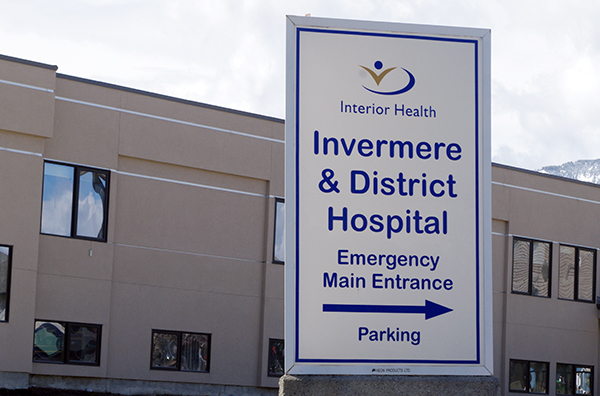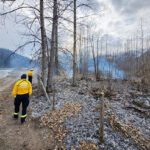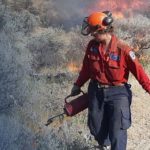Home »

IDH Chief addresses COVID-19 facts and testing
Dr. Gareth Mannheimer, Chief of Staff of Invermere & District Hospital and local family physician provides a local update on COVID-19, re-affirms the need to remain vigilant and discusses new development in antibody testing.
Thank you for acting responsibly over the Easter weekend by staying smart and staying apart. Your commitment to social and physical distancing, complying with provincial guidelines and recommendations during this COVID-19 pandemic is making a huge difference. We are playing our part in flattening the curve, gaining traction and on behalf of your medical providers – we appreciate your efforts.
Our region has continued to do very well over the past week. All our locals diagnosed with COVID-19 continue to do very well. It is important to stress again that this virus remains a significant threat and, I continue to urge everyone to stay focused in the weeks ahead.
Vigilance Remains Top Of Mind
I recognize that our new reality is getting more and more frustrating. Many of us are struggling. Now more than ever is the time to stay calm and play it safe.
This virus is novel. This means there is not a single person among us who has immunity. Even if you think you are fit, and unlikely to struggle with the symptoms, I would ask you to consider the frail and vulnerable.
We are learning asymptomatic people (those with mild or no reported symptoms) are still contagious and capable of spreading the virus. Plus, the virus has a long incubation period with people not showing symptoms for an average of five days after infection.
Together, these factors result in many people who are infected spreading the virus without even knowing it.
Please, stay home if you can. If you must go out, maintain a physical distance of at least two metres (6.5 feet) from other people whenever you can. Please continue to wash your hands diligently. If you are symptomatic, self-isolate, use the provincial self-assessment tool and seek medical advice if you need further assessment.
Call us first! We are prepared and ready to help you.
Our local medical clinics are open and your doctors and medical health care providers remain ready to respond to all your health needs including questions about COVID-19. The hospital and the clinics can be reached at the phone numbers listed below:
Invermere & District Hospital – (250) 342-9201
Invermere Medical Clinic – (250) 342-9206
Chisel Peak Clinic – (250) 341-6900.
We appreciate the continued general decline in the use of the hospital Emergency Department for non-emergency ailments. This has made a big difference in allowing us to deal with critical cases quickly. I would like to stress again though that people can and will get sick during this pandemic. If you feel extremely unwell don’t hesitate to seek medical help. If you are unsure, please just call the clinics or the hospital on the phone numbers listed above. We are available to discuss your symptoms and offer direction on the next steps for you and your family.
We are in this together and we are here for you.
We have weathered the first stage of this pandemic and come out quite strong. If we lose focus too soon or the restrictions are lifted too early, the huge sacrifices you have all made could be in vain. Please continue social and physical distancing, wash your hands, try not to touch your face, consider a face cloth covering when out in public and stay at home whenever possible. If you are symptomatic, you must try to self-isolate and stay at home for at least 10 days and until your symptoms have disappeared.
If you are unsure about these recommendations, please contact us for clarity. We are here for you and eager to offer help when needed. By seeking information, you are helping protect your family, your neighbours, your friends and our community.
Diagnostic Testing and Expansion
Our capacity to test for the virus is ramping up. We are now able to expand testing to a few extra groups including patients with a fever and a new onset of or worsening of cough or shortness of breath who are:
- Residents of remote, isolated, or indigenous communities;
- People living and working in congregate settings such as work-camps, correctional facilities, shelters, group homes, assisted living and seniors’ residences;
- People who are experiencing homelessness or have unstable housing;
- Essential service providers;
- Returning travellers identified at a point of entry into Canada.
This, is in addition to the groups already being tested including:
- Residents and staff of long-term care facilities.
- Healthcare workers.
- Patients requiring hospitalization, or likely to be hospitalized including pregnant women in their third trimester, patients on hemodialysis or cancer patients receiving radiation or chemotherapy.
- Part of an investigation of a cluster or outbreak.
What Is An Antibody Test And How Can We Use It?
Currently, the diagnostic tests that are approved for use in Canada work by identifying the actual genetics or the make-up of the virus. The function of these tests is to identify patients who actually have the live virus in their body. These are traditional tests that test for the presence of the virus. We are learning that understanding asymptomatic transmission (without symptoms) of the virus may be key to understanding how COVID-19 is spreading – and, hopefully, to eventually stopping it. New tests called antibody tests may be a key tool for us in the near future.
As doctors, we are currently being asked about a new antibody test and what its value is in the current pandemic.
These new rapid antibody tests use just a couple of drops of blood from a pinprick on the finger to detect the presence of antibodies that fight the virus. There is no trip to the laboratory, results are available on the spot in 15 minutes. It costs about $10 per test.
While the test can’t detect the virus in its early stage, this blood test is effective at diagnosing people about five to seven days after symptoms show up, once the body has had a chance to produce antibodies.
In normal cases, when you are exposed to an infection such as the COVID-19, your body’s immune system is activated to fight the infection.
One of the ways it does this is to form specific proteins called antibodies which identify the virus and help the rest of the immune system destroy it. We have learned ways of identifying these antibodies. In doing so, we can identify patients who have been exposed to the virus and, those who are likely immune to it.
The value of antibody testing is not to identify who HAS the virus, but rather to identify patients who have HAD the virus and are now considered immune. To know you are immune would provide important information to help get people back to work and feel safe moving around the community, while we wait for a vaccine to be approved.
The new rapid antibody tests that we are hearing about have not yet been approved for use in Canada. Ottawa is being urged to fast-track the new rapid coronavirus test. But, it’s critically important to remember we need to know this test will be as effective as it claims to be. The stakes are very high with this novel virus. With this in mind, doctors and scientists are working diligently to be very sure the new rapid antibody tests are validated and accurate. Otherwise, no value can be put into the test results no matter how badly we want them. Once a validated test is available, we are hopeful we will be able to use it widely. And, I will keep you informed.
More Words Of Thanks
I continue to be humbled by the generosity and willingness of those who have shared precious personal protective equipment (PPE) for our doctors and medical health care providers. We are so thankful for the donations from individuals and businesses from our local community and our part-time residents from Alberta. These donations continue to be ongoing.
I would like to thank the many seamstresses in the valley who have volunteered and have already made and donated face protection to the hospital and the community. Please keep making masks. Please drop completed items off at the Invermere Fire Department.
I encourage you to reach out to Erin Chandler who can be reached at [email protected] before you head over to the Firehall so that we can manage the logistics safely and effectively. Erin will be our key coordinator so that everyone in the Valley gets fair and equal access. The Pioneer published locations where you can pick up your cloth face coverings if you cannot make your own.
I remain astounded at the dedication, selflessness and generosity of our community.
There are many individuals working incredibly hard behind the scenes, offering their time and skills in so many ways to help co-ordinate these projects. Please know that we value each and every one of you. If you are interested in seeing how you can contribute to this effort, please have a look at www.volunteercv.ca.
Those of us with children have a new small window into the daily lives of teachers and the big role that they play in our lives. The pandemic has brought sudden and profound changes to the education of our youth and your adaptability and dedication your students shines through. I thank you now more than ever.
We are doing well, we are coping and together we will weather this pandemic. Stay strong.
Dr. Gareth Mannheimer







